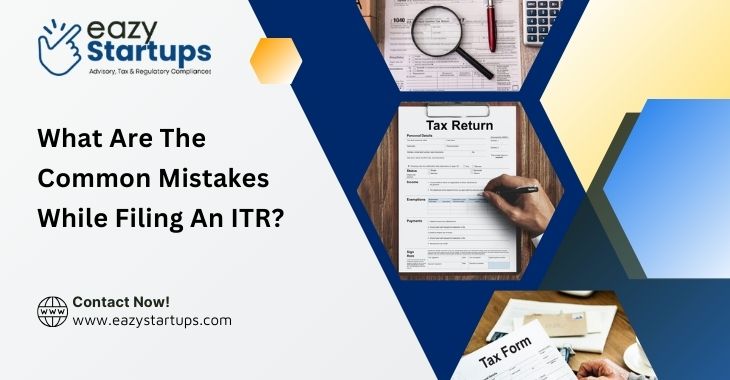For all taxpayers, filing Income Tax Returns (ITR) is an essential duty that guarantees adherence to tax regulations and prevents fines. However, a lot of people make typical mistakes while filing their ITR, which can cause problems with the tax authorities and even result in fines. Filing may be done more efficiently and without errors if you know these pitfalls and how to avoid them. If you apply for Income Tax Filing or Income Tax Return Filing, contact Eazy Startups for the best assistance.
The following are a few of the most typical errors to avoid:-
- Inaccurate Personal Data
- Picking the Incorrect ITR Form
- Not Reporting All Income Sources
- Disregarding Exemptions and Deductions
- Incorrect Tax Calculation
- Neglecting to Check the ITR
- Missing the Filing Deadline
Inaccurate Personal Data:
One of the most common mistakes is incorrectly entering personal information, such as name, address, and bank account details. Errors in the bank information, Aadhaar number, or PAN number can result in rejection or major delays in processing your return.
How to avoid:
Verify all of your personal information one more time before submitting your return.
Ensure your tax records’ details correspond with your PAN and UID.
Picking the Incorrect ITR Form:
One typical error that might result in your return being rejected is selecting the wrong ITR form. Your choice of form will rely on your revenue streams, including capital gains, business income, and wages.
How to avoid:
Recognize the various ITR forms available and choose the one that corresponds with your sources of income.
See the Income Tax Department’s instructions or speak with a tax expert if unclear.
Not Reporting All Income Sources:
Neglecting to declare all sources of income, including interest from savings accounts, fixed deposits, rental income, and freelancing work, may result in disparities and possible investigation by the tax authorities.
How to avoid:
Throughout the year, keep a note of all your sources of income.
Verify your income by comparing it to your bank statements, Form 16, and other pertinent records.
Disregarding Exemptions and Deductions:
Taxpayers frequently fail to take advantage of allowable deductions and exemptions, which increases their taxable income. Among others, deductions under Sections 80C, 80D, and 80E are frequently made.
How to avoid:
Learn about the many possible exemptions and deductions.
Keep accurate records for every deduction you intend to make.
Incorrect Tax Calculation:
Overpaying or underpaying taxes can result from computation errors involving taxable income and tax liabilities. Inaccurate computations may result from using antiquated tax slabs or neglecting to consider exemptions.
How to avoid:
Use the most recent tax slab rates for the applicable fiscal year.
Use tax calculators available online or consult a tax expert for guidance.
Neglecting to Check the ITR:
Many taxpayers fail to electronically validate their returns after submitting their ITRs or to transmit a physical copy of the ITR-V to the Centralized Processing Center (CPC). An ITR that has not been confirmed is deemed void.
How to avoid:
Use Aadhaar OTP, Net Banking, or EVC to e-verify your ITR.
Send the signed ITR-V to the CPC within 120 days if you use physical verification.
Missing the Filing Deadline:
If you file your ITR after the deadline, you may be penalized with late penalties, interest on the amount owed, and the loss of several advantages. You must file your return by the deadline.
How to avoid:
Put a reminder in your calendar and note the due date.
Prepare ahead of time to minimize last-minute rushes when filing.
Conclusion
Accurately filing ITRs is essential to upholding legal compliance with taxes and keeping a spotless financial record. If you apply for Income Tax Filing or Income Tax Return Filing, contact Eazy Startups for the best assistance.

